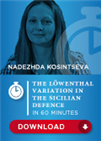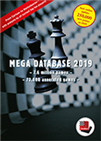Is this 1992?
 Garry Kasparov's rise to the top was meteoric and at his very first attempt he managed to become World Champion, the youngest of all time. In over six hours of video, he gives a first hand account of crucial events from recent chess history, you can improve your chess understanding and enjoy explanations and comments from a unique and outstanding personality on and off the chess board.
Garry Kasparov's rise to the top was meteoric and at his very first attempt he managed to become World Champion, the youngest of all time. In over six hours of video, he gives a first hand account of crucial events from recent chess history, you can improve your chess understanding and enjoy explanations and comments from a unique and outstanding personality on and off the chess board.Russia took gold medals at the open section of the European Team Championships for a fifth time since the dissolution of the Soviet Union — the USSR won in 1989 and Russia won the next time the event took place, in Debrecen 1992. While Garry Kasparov was the leader of that team, Peter Svidler was the one on first board the next three occasions Russia got gold. The eight-time national champion was not part of the line-up this year though, as a renewed squad took over.
The Ukrainians, who were co-leaders until round eight, ended up in second place. Surprisingly, they never got gold at this event, and this is the second time they take home silver medals. The last time they did was precisely in 1992, when none other than Vassily Ivanchuk was their first board. Ivanchuk, a player known for taking team events very seriously, played all nine rounds and scored 5½ points, getting the seventh highest rating performance in Batumi.
England took third place and — yes, you got that right — they also got bronze back in 1992! The English went on to get their only gold in the next edition, played in 1997. Needless to say, Mickey Adams was in the line-up both times. Much like Ivanchuk, the 47-year-old from Truro collected 5½ points after playing all nine rounds. In Debrecen, twenty-seven years ago, Adams got the third best rating performance, below FIDE Master Vladimir Kramnik and world champion Kasparov.

The 2019 winners — Alexander Riazantsev, Maxim Matlakov, Kirill Alekseenko, Dmitry Andreikin, Nikita Vitiugov, Daniil Dubov and Alexander Motylev (captain) | Photo: Twitter account of the Russian Chess Federation
The final round
|
|
Ukraine |
13 |
2 |
: |
2 |
11 |
Croatia |
|
|
|
Russia |
13 |
2½ |
: |
1½ |
10 |
Poland |
|
|
|
Germany |
11 |
1½ |
: |
2½ |
12 |
England |
|
On top board, the Croatian team proved they did not get to face the co-leaders in the last round by mere coincidence, as they drew Ukraine in a hard-fought match. The last game to finish was tense-packed, as Ivanchuk could not break Ivan Saric's fortress in an endgame with queen and pawn versus rook and pawn.
Ukraine vs. Croatia
While Saric defended that position, the Russians had already won their match against Poland. Three balanced games finished in draws, but Kirill Alekseenko was the key figure for the eventual champions, as he took down Kacper Piorun on board three.
Russia vs. Poland
Other player who came from having a good outing on the Isle of Man — like Alekseenko — gave England match victory over Germany. David Howell outplayed Daniel Fridman in a complex queenless middlegame to get his team the bronze medals. The Germans had a great performance until round seven, when they drew Russia, but consecutive losses against Ukraine and England relegated them to ninth place.
Germany vs. England
Individual medals - Open
Gold medallist on board two Berkes Ferenc from Hungary got the best rating performance of the event, scoring an undefeated 5 out of 7 in Batumi. Two other players that stand out in these lists are Daniil Dubov, who not only performed well but also played enterprising chess from start to finish, and Alexei Shirov, who got gold on board three and proved that his strong showing at the Grand Swiss was not a chance occurrence.
 Ever since the Kasparov-Kramnik WCh match (London 2000) players with the white pieces have been breaking their teeth biting on the Berlin Wall in the Ruy Lopez. The situation from White’s point of view has become precarious – ducking it is equivalent to capitulation, because in all alternative variations to the Berlin endgame White gives up from the start on the struggle for an opening advantage. White has to find ways to crack open Black’s defence. There is hardly any other grandmaster of his class who is as well known for his uncompromising and creative play as the Latvian Alexei Shirov.
Ever since the Kasparov-Kramnik WCh match (London 2000) players with the white pieces have been breaking their teeth biting on the Berlin Wall in the Ruy Lopez. The situation from White’s point of view has become precarious – ducking it is equivalent to capitulation, because in all alternative variations to the Berlin endgame White gives up from the start on the struggle for an opening advantage. White has to find ways to crack open Black’s defence. There is hardly any other grandmaster of his class who is as well known for his uncompromising and creative play as the Latvian Alexei Shirov.
| Board 1 |
| Rk. |
|
Name |
Rtg |
Team |
Rp |
Pts. |
% |
Games |
| 1 |
GM |
Andreikin Dmitry |
2741 |
Russia |
2817 |
5,5 |
68,8 |
8 |
| 2 |
GM |
Aronian Levon |
2758 |
Armenia |
2790 |
5,0 |
62,5 |
8 |
| 3 |
GM |
Ivanchuk Vassily |
2686 |
Ukraine |
2771 |
5,5 |
61,1 |
9 |
| Board 2 |
| Rk. |
|
Name |
Rtg |
Team |
Rp |
Pts. |
% |
Games |
| 1 |
GM |
Berkes Ferenc |
2667 |
Hungary |
2844 |
6,0 |
85,7 |
7 |
| 2 |
GM |
Kuzubov Yuriy |
2636 |
Ukraine |
2767 |
4,0 |
66,7 |
6 |
| 3 |
GM |
Vitiugov Nikita |
2732 |
Russia |
2749 |
4,5 |
64,3 |
7 |
| Board 3 |
| Rk. |
|
Name |
Rtg |
Team |
Rp |
Pts. |
% |
Games |
| 1 |
GM |
Shirov Alexei |
2664 |
Spain |
2781 |
6,5 |
81,3 |
8 |
| 2 |
GM |
Halkias Stelios |
2530 |
Greece |
2781 |
5,5 |
78,6 |
7 |
| 3 |
GM |
Volokitin Andrei |
2627 |
Ukraine |
2748 |
4,5 |
64,3 |
7 |
| Board 4 |
| Rk. |
|
Name |
Rtg |
Team |
Rp |
Pts. |
% |
Games |
| 1 |
GM |
Dubov Daniil |
2699 |
Russia |
2805 |
5,5 |
78,6 |
7 |
| 2 |
GM |
Onischuk Vladimir |
2616 |
Ukraine |
2760 |
6,0 |
75,0 |
8 |
| 3 |
GM |
Jones Gawain C B |
2688 |
England |
2713 |
5,5 |
68,8 |
8 |
Final standings (top 10) - Open
| 1 |
1 |
|
Russia |
RUS |
9 |
6 |
3 |
0 |
15 |
224,5 |
22,5 |
| 2 |
8 |
|
Ukraine |
UKR |
9 |
6 |
2 |
1 |
14 |
236,5 |
22,5 |
| 3 |
2 |
|
England |
ENG |
9 |
6 |
2 |
1 |
14 |
219,0 |
22,5 |
| 4 |
5 |
|
Armenia |
ARM |
9 |
6 |
1 |
2 |
13 |
222,5 |
22,5 |
| 5 |
15 |
|
Croatia |
CRO |
9 |
5 |
2 |
2 |
12 |
187,0 |
19,0 |
| 6 |
4 |
|
Azerbaijan |
AZE |
9 |
5 |
1 |
3 |
11 |
197,5 |
20,5 |
| 7 |
6 |
|
Spain |
ESP |
9 |
4 |
3 |
2 |
11 |
184,5 |
22,0 |
| 8 |
9 |
|
Germany |
GER |
9 |
4 |
3 |
2 |
11 |
180,0 |
18,5 |
| 9 |
13 |
|
France |
FRA |
9 |
4 |
3 |
2 |
11 |
169,0 |
20,5 |
| 10 |
12 |
|
Czech Republic |
CZE |
9 |
5 |
1 |
3 |
11 |
166,0 |
19,5 |
...40 teams
All games from Round 9 - Open
All games available at Live.Chessbase.com
Third straight gold for Russia in the Women's
Talking of 1992, that was also the first time a separate event for women was in place. Back then, Ukraine, Georgia and Azerbaijan reached the podium. The Russian team did not get into the top three until they got bronze medals consecutively in 2003 and 2005. From then on, however, they have pretty much taken over — they won six out of the last seven editions, only finishing second in 2013, when they were upset by Israel in round two.
Their fourth round win over Georgia proved crucial, as the local squad finished only one match point behind. In the last day of action, the Russians were categorical against Turkey, scoring a clear 3½:½ victory.
The Russians had a scare in round eight, when they drew Armenia in a highly tense match. Armenia, however, could not reach the podium, as they were defeated by Azerbaijan in the final round. The Azerbaijani squad got bronze...like they had done in 1992!
|
|
Russia |
14 |
3½ |
: |
½ |
11 |
Turkey |
|
|
|
Georgia 2 |
10 |
1 |
: |
3 |
13 |
Georgia |
|
|
|
Azerbaijan |
12 |
2½ |
: |
1½ |
11 |
Armenia |
|
 In this 60 minutes video GM Nadezhda Kosintseva offers White a repertoire to counter the Löwenthal Variation.
In this 60 minutes video GM Nadezhda Kosintseva offers White a repertoire to counter the Löwenthal Variation.
The top three boards of the Russian team finished undefeated | Photo: Official site

Nana Dzagnidze and Lela Javakhishvili led the Georgian team | Photo: Official site
Individual medals - Women
Georgia's Nana Dzagnidze got the highest rating performance among the women in Batumi, scoring 7 out of 9 on board one. Nevertheless, the most surprising individual result was achieved by Armenia's Anna Sargsyan (b. 2001) — with a 2312 rating, she collected 7 out of 8 points, thus achieving a 2626 rating performance. Meanwhile, 56-year-old Pia Cramling is still going strong, as she scored 8 out of 9 on Sweden's top board.
 The "Mega" is the database every serious chessplayer needs. The database contains 7.6 million games from 1500 to 2018, in highest quality standard, full of top level analyses and completely classified.
The "Mega" is the database every serious chessplayer needs. The database contains 7.6 million games from 1500 to 2018, in highest quality standard, full of top level analyses and completely classified.
| Board 1 |
| Rk. |
|
Name |
Rtg |
Team |
Rp |
Pts. |
% |
Games |
| 1 |
GM |
Dzagnidze Nana |
2502 |
Georgia |
2639 |
7,0 |
77,8 |
9 |
| 2 |
GM |
Cramling Pia |
2462 |
Sweden |
2621 |
8,0 |
88,9 |
9 |
| 3 |
IM |
Mammadzada Gunay |
2427 |
Azerbaijan |
2565 |
5,5 |
68,8 |
8 |
| Board 2 |
| Rk. |
|
Name |
Rtg |
Team |
Rp |
Pts. |
% |
Games |
| 1 |
GM |
Lagno Kateryna |
2549 |
Russia |
2597 |
6,5 |
81,3 |
8 |
| 2 |
IM |
Peptan Corina-Isabela |
2371 |
Romania |
2586 |
6,5 |
81,3 |
8 |
| 3 |
IM |
Javakhishvili Lela |
2457 |
Georgia |
2472 |
5,0 |
62,5 |
8 |
| Board 3 |
| Rk. |
|
Name |
Rtg |
Team |
Rp |
Pts. |
% |
Games |
| 1 |
WGM |
Girya Olga |
2476 |
Russia |
2547 |
4,5 |
75,0 |
6 |
| 2 |
IM |
Matnadze Ana |
2383 |
Spain |
2488 |
6,0 |
75,0 |
8 |
| 3 |
IM |
Skripchenko Almira |
2403 |
France |
2466 |
5,0 |
71,4 |
7 |
| Board 4 |
| Rk. |
|
Name |
Rtg |
Team |
Rp |
Pts. |
% |
Games |
| 1 |
WIM |
Sargsyan Anna M. |
2242 |
Armenia |
2626 |
7,0 |
87,5 |
8 |
| 2 |
IM |
Arabidze Meri |
2398 |
Georgia |
2571 |
6,5 |
81,3 |
8 |
| 3 |
IM |
Mammadova Gulnar |
2369 |
Azerbaijan |
2532 |
6,5 |
81,3 |
8 |
Final standings (top 10) - Women's
| 1 |
1 |
|
Russia |
RUS |
9 |
7 |
2 |
0 |
16 |
256,0 |
26,0 |
| 2 |
2 |
|
Georgia |
GEO |
9 |
7 |
1 |
1 |
15 |
257,0 |
25,5 |
| 3 |
5 |
|
Azerbaijan |
AZE |
9 |
6 |
2 |
1 |
14 |
230,0 |
22,5 |
| 4 |
3 |
|
Ukraine |
UKR |
9 |
6 |
0 |
3 |
12 |
173,5 |
19,0 |
| 5 |
14 |
|
Netherlands |
NED |
9 |
6 |
0 |
3 |
12 |
144,5 |
19,5 |
| 6 |
8 |
|
Romania |
ROU |
9 |
5 |
1 |
3 |
11 |
184,0 |
22,5 |
| 7 |
13 |
|
Armenia |
ARM |
9 |
4 |
3 |
2 |
11 |
181,5 |
20,5 |
| 8 |
10 |
|
Turkey |
TUR |
9 |
5 |
1 |
3 |
11 |
168,5 |
19,0 |
| 9 |
9 |
|
Georgia 2 |
GEO |
9 |
4 |
2 |
3 |
10 |
178,0 |
19,5 |
| 10 |
7 |
|
Hungary |
HUN |
9 |
4 |
2 |
3 |
10 |
151,0 |
17,0 |
...32 teams
All games from Round 9 - Women's
All games available at Live.Chessbase.com
Links
























